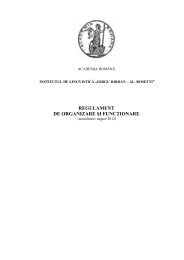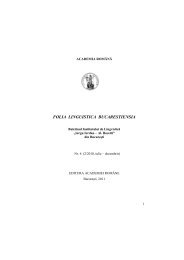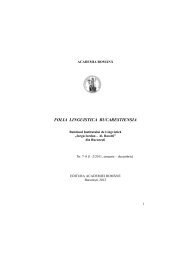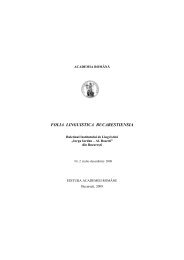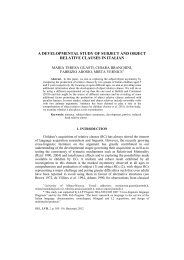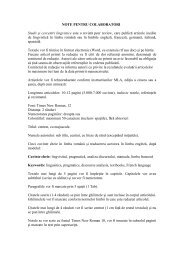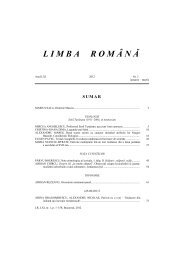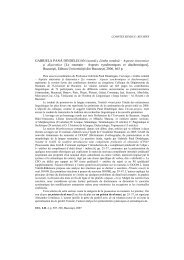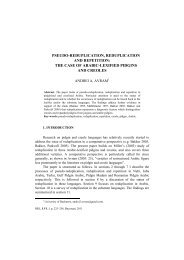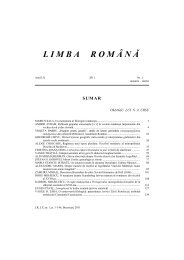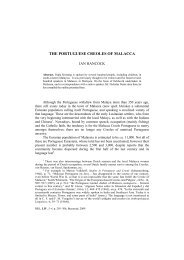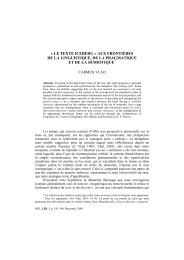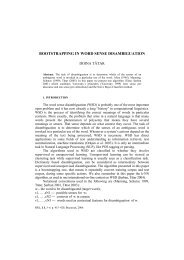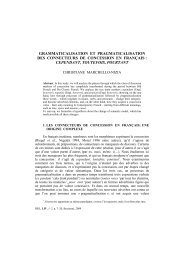'NOTHING' OR 'ANYTHING': TERMS IN IRISH AND SCOTTISH ...
'NOTHING' OR 'ANYTHING': TERMS IN IRISH AND SCOTTISH ...
'NOTHING' OR 'ANYTHING': TERMS IN IRISH AND SCOTTISH ...
Create successful ePaper yourself
Turn your PDF publications into a flip-book with our unique Google optimized e-Paper software.
218Seosamh Watson 14‘at all’, lit. ‘in any condition’, and there are two Connacht examples of a form infinal -e, which probably derives from an oblique case form. Though not soqualified in the LASID examples, faic, as is well known, can also be qualifiedthrough the addition of the substantive phrase na fríde (see above 2.6). Thehistorical corpus of Irish, CG, (1600-1882), documents no instances of faic(e)before the late 17 th century which makes likely the suggestion that the word is aloan-word derived from English whack. Although its use in expressions of the typeunder consideration is not restricted to phrases involving ‘doing, making’, its originin the idea of a ‘blow’ or ‘stroke’ would be similar to the familiar phrase stróicoibre ‘a stroke of work’, cf. Ó Dónaill (1977: 1173) in which the first term is aborrowing from English stroke). This phrase is common in modern colloquial Irish.The following item also should be considered in the same semantic range.6.4.2. tap: this term, which is clearly from English tap, has been recorded ina N. Connacht 7 dialect with reference to ‘doing’. It would seem likely that its entryinto Irish was based on a familiarity with the English expression ‘not (doing) a tap(of work)’.6.4.3. car: this word is recorded in the sense of ‘nothing’ in the context of‘doing’ in Scottish Gaelic, cf. Dwelly (1977: 167) cha robh car air an t-saoghal‘there was nothing at all’, lit. ‘in the world’, cf. air/ sam bith (v. 1.1.1), although itdoes not feature in LASID. In the modern language it signifies, among other things,a ‘turn, spell of work’, cf. gabh car! ‘take a turn!’. The corresponding Middle Irishform is cor ‘state, condition’, which is to be referred to the verb cuir ‘put’, EarlyIrish stem cuir-. To the same IE root from which the latter may derive have beencompared forms such as Gk σκαίρω ‘dance’, OSl. skorǔ ‘fast’. Cor is, of course,the word which appears in the qualifying adverbial expressions already referred tomeaning ‘at all’ which are noted above at various points, namely ar chor bith, andin aon chor. However, the Scottish expression here discussed does not appear inIrish sources and relates firmly to the notion of a ‘turn of work’ in the latter language.6.5.1. fionna-feanna: one most interesting instance to be included in thiscategory is again obtained from Lane (1922: 1089) and McKenna (1935: 893). Thelatter, who provides most information, cites it for Connacht in two senses: (i) ‘notto leave a bit’; and (ii) ‘not to have (a tap) of work to do’. Lane quotes the secondsense with the fuller spelling fionnadh feannadh. The second word here is clearlythe verbal noun of feann ‘to skin, flay’ preceded by the related noun fionnadh ‘fur’,cf. the common English idiom ‘to be skint’. Both are connected via the notion of‘perception’, hence ‘surface [appearance]’, to Early Irish fiss ‘knowledge’, cf. Latvideo, Gk ιδει)ν McKenna also provides a variant fionnafeanc, where the latterelement would have been influenced by faic(e) (v. 6.4.1).7 Information supplied by Prof. Ó Catháin.



